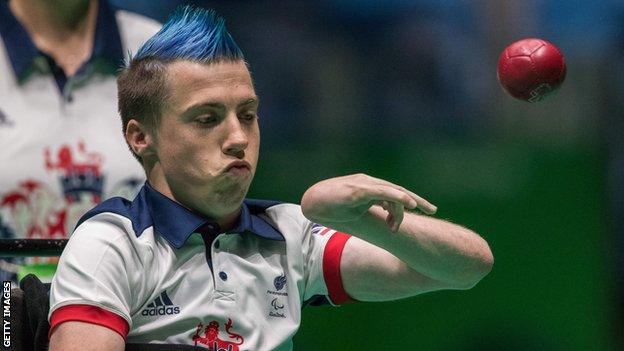Boccia at Tokyo Paralympics: All you need to know
- Published

David Smith is the most experienced member of the GB team
Paralympic Games on the BBC |
|---|
Venue: Tokyo, Japan Dates: 24 August-5 September Time in Tokyo: BST +8 |
Coverage: Follow on Radio 5 Live and on the BBC Sport website |
Key information
Dates: 28 August-4 September
Venue: Ariake Gymnastics Centre
Gold medals on offer: Seven
How does it work?
Boccia is one of three Paralympic-specific sports which has no Olympic counterpart and is for athletes with conditions like severe cerebral palsy and muscular dystrophy that affects all four limbs.
The sport is played indoors on a court similar in size to badminton with players positioned at one end.
Both sides have six balls - one side has red balls, the other blue balls and the aim of the game is to get your balls closer to the white target ball, the jack, than your opponent.
The balls are made of leather and are filled with plastic granules so they do not bounce and are easy to grip.
Individual and pairs matches consist of four ends while team matches have six ends. Once all ends have been played, the side with the highest score is the winner.
To start an end, one side will throw the jack. They will then throw their first ball trying to get it as close as possible. The other side then attempts to throw their ball closer. After that, the side whose ball is not closest to the jack throws the next ball. Once all balls have been played, points are awarded. The side that is closest to the jack receives a point for every ball they have nearer than their opponent's closest ball.
There are four classifications and all events are mixed.
BC1 players have cerebral palsy and are allowed to use their hands or feet to play the ball. They are permitted to have an assistant on court to pass them the ball before they throw.
BC2 players have cerebral palsy and are more able to grip and release the ball. They do not have an assistant on court and have to throw the ball on to the court.
BC3 players have cerebral palsy or other conditions and have the highest level of impairment. They are unable to throw or kick the ball and play using a ramp which is positioned by an assistant who faces away from play and is not allowed to turn around for the duration of the end. The assistant also places the ball on the ramp for the player to release.
BC4 players do not have cerebral palsy and are able to throw the ball into play.
Who are the British medal hopes?
David Smith goes in as defending Paralympic champion in the BC1 category and is also the current world and European champion. As well as the individual event, Smith and team-mates Claire Taggart and Will Hipwell will hope to impress in the BC1/2 team event.
Who are the other challengers?
With five medals, including two golds, Thailand were the most successful nation at the Rio Paralympics but they were beaten to top spot at the 2018 Worlds by China. Greece, led by Greg Polychronidis, are regular medal winners and both South Korea and Slovakia will be chasing medals.
Did you know?
When his local leisure centre closed during the pandemic, debutant Hipwell trained on the family farm, using the grain barn as a temporary court.
ParalympicsGB Rio 2016 medals
One gold (David Smith)